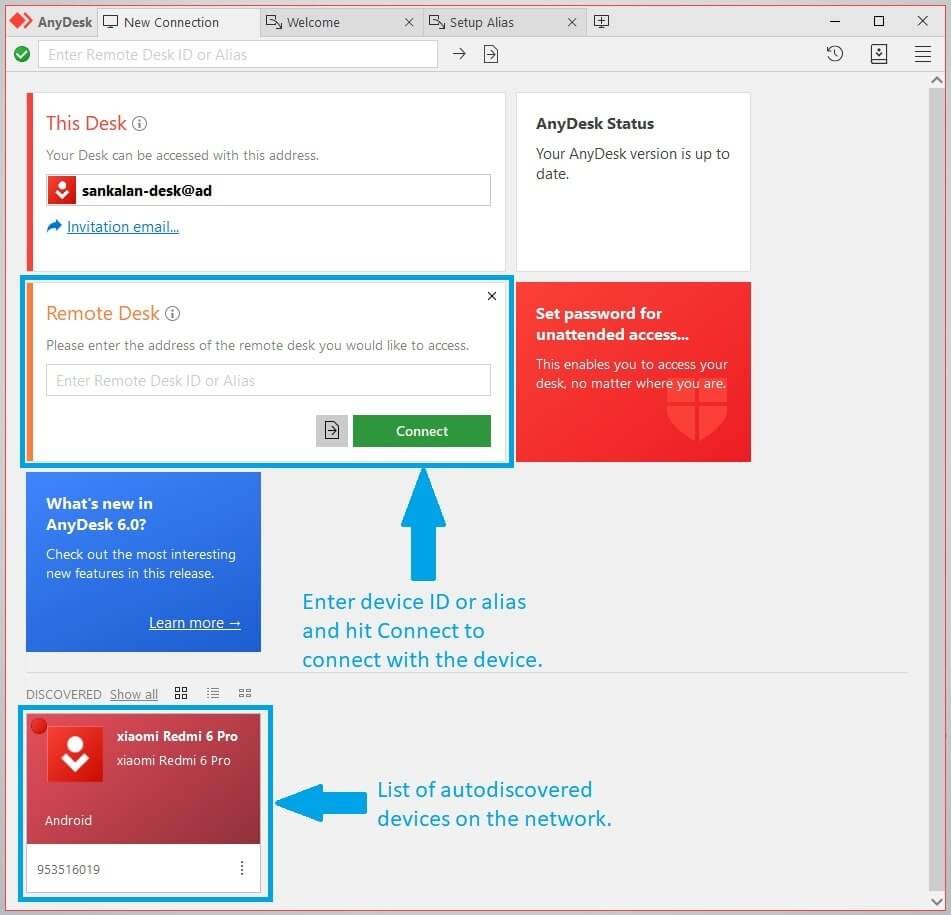I've been struggling to install AnyDesk in a flashed Ubuntu Server 20.04 image for Raspberry PI 4. What I've done is the following: delete and clear all other previous installations: sudo apt-get purge anydesk. Sudo apt-get autoclean. Sudo apt-get autoremove. Adding armhf arquitechture (after step 1 some things must be reinstalled again). Amazons3 anydesk applicationdevelopment aws awsaa awsec2 awss3 awssaa cloud cloudtrail cloudwatch cron cronjob csm developmentprocess docker dockerclient dockerdaemon dockerhost dockerregistry ec2 elasticip fb-app horizontalscaling installreactjs interviewquestions loadbalancer nodejs non-relationaldatabase NoSQL questionanswers Raspberry pi.
No email, registration or installation required!
AnyDesk provides powerful Linux-based connectivity for smooth and seamless remote access to any computer. Whether as an individual, or as a professional organization offering remote support to customers, AnyDesk is made for easy operation and solid remote connectivity.
AnyDesk remote control for Linux desktops ensures uninterrupted connections to any Linux based operating system. Ideal for Ubuntu users, AnyDesk’s solution for Linux remote access is built for stable operation and allows you to access remote desktops in Linux from Windows, Mac, and other Linux based systems. Enjoy simple and user-friendly set up and administration tools. Download AnyDesk for free as a private user!
Stability, Performance, Security - The AnyDesk Remote Desktop for Linux
Featuring high frame rates, low latency, and optimal bandwidth efficiency, AnyDesk remote desktop for Linux features our innovative DeskRT codec, ensuring all tasks can be performed with near-instant response times and superb bandwidth efficiency. Our remote desktop manager for Linux provides cutting-edge technologies for any application.
The AnyDesk Linux remote desktop ensures your connections are always safe through banking-standard TLS 1.2 encryption and RSA 2048 asymmetric key exchange encryption. AnyDesk also offers full support for your own networking solutions, giving you the opportunity to use our Linux remote access tools without connecting to the internet.
The AnyDesk Linux remote desktop works with a huge range of Linux distributions including Ubuntu, Red Hat, openSUSE, and Fedora. A generic Linux version is also available for other custom systems in either 32-bit or 64-bit.
AnyDesk remote desktop for Linux keeps file sizes small, so downloads are fast. Choose your Linux distribution and follow the package manager for a quick and easy install.
Updates are always free, whatever type of license you own, and all program versions remain compatible with one another.
Version 6.1.115 Apr 2021
- Improved file size used to send information to Support:
Added function that compresses all necessary logfiles when communicating with Support. - Fixed bugs related to stability:
Fixed a bug where the user got stuck with 'waiting for image' window. Fixed a memory leak in the video codec. - Fixed bugs related to visual quality:
Fixed a bug that caused image artifacts to appear during sessions. Fixed a visual glitch in the Address Book. - Fixes in the session player:
Fixed a bug where a session recording may not play immediately. - Other small improvements:
Removed social media buttons. Removed capture tab from settings as image artifacts have been fixed.
28 Jan 2021
- New features for improved session usability and picture quality:
Added lossless color mode. Follow mouse mode. Follow focused window mode. Implemented auto-disconnect feature. Added transmit hotkeys as a session setting in the menu. - New special keys for compatibility with Android:
Add Android special keys to keyboard menu. - Various functional and usability improvements:
Improved 2FA. Improved Wake on LAN. Reworked the session recording settings. - Fixes in the session player:
Fixed a crash in the session player. Fixed a bug that caused graphical glitches at the beginning of session recordings in the player. - Important - support for 32bit operating systems:
Support for 32bit operating systems has ended with version 6.1.0. We strongly recommend upgrading to 64bit operating system.
25 Aug 2020
- Capture settings panel:
Allows disabling the XDamage extension if you have issues with screen artifacts (warning: may impact performance). - Improved iOS support:
Support for improved connections to iOS devices. - Fixed deadlock:
Fixed a potential deadlock at the beginning of a session, resulting in the 'Waiting for Image' message to never disappear.
28 Jul 2020
- Two-Factor Authentication:
When enabled, an additional dialog will be shown after authentication by password or token, requesting a time-based one-time password provided by a third device. This feature requires an app supporting TOTP. - Wake-on-Lan:
When enabled, devices running AnyDesk that are currently in sleep mode can be woken up by other AnyDesk devices in the same local network. - Security improvement:
AnyDesk now supports Perfect Forward Secrecy to strengthen its already strong security for data transfer. - Improved Dark Themes support:
AnyDesk now supports Dark Themes by defaulting to Adwaita Theme. - Premium dialog shown even on paid licenses:
Fixed Open Address Book on Startup feature showing the premium dialog even on paid licenses. - Keyboard layout on Fedora 31:
Fixed keyboard layout change on Fedora 31. - Bugfixes:
Fixed a couple of small bugs.
8 May 2020
- Bugfix:
Fixed Debian package dependencies to allow installation on Debian Bullseye.
20 Apr 2020
- Start/Stop of session recording:
It is now possible to start/stop recording during the active session. - Discovery feature security:
Significantly improved security of Discovery feature. - Bugfixes:
Fixed online states. Fixed a deadlock in the frontend.
25 Feb 2020
- Bugfix:
Fixed a bug that might cause 32bit versions to fail.
21 Feb 2020
- Security hardening:
Hardened Linux/FreeBSD/RPi via FULL RELRO. - Bugfix:
Fixed a security vulnerability.
17 Feb 2020
- New option when session ends:
Added lock account on session end feature. - Usability improvements:
Improved minor GUI details. Refactored X11 code to put much less load on X Server. Fixed primary monitor not beeing selected on session start. - Crash bugfix:
Fixed privacy/input blocking crashing certain versions of i915 driver. - Minor bugfixes:
Several minor bugs have been fixed.
3 Dec 2019
- New Privacy feature indicator:
Added Privacy indicator into the statusbar to always reflect the current privacy status. - New Privacy feature security settings:
Added unattended access privileges in the security settings which can override the standard permissions if connected via unattended access. - Minor bugfixes:
Several minor bugs have been fixed.
18 Nov 2019
- VPN connection:
With this mode two PCs can be put into a private network over a secured connection - Android compatibility:
Added transmission of Android special keys
31 Oct 2019
- Bugfixes:
Fixed a couple of minor bugs.
24 Oct 2019
- New feature:
New Privacy feature added. - Wrong keyboard layout:
Fixed a bug with wrong keyboard layout in some distributions and on some login screens. - Modifier keys:
Fixed a bug that would release modifier keys after typing one character on certain configurations. - Bugfixes:
Fixed couple of minor bugs.
26 Aug 2019

- Remote reboot:
Added remote reboot support. - Command line:
Added more options to the command line interface. - Search in filebrowser:
Fixed searching by typing in the filebrowser. - Audio device:
Fixed a bug that prevented from selecting a different audio device. - Bugfixes:
Fixed some minor bugs.
13 Jun 2019
- Bugfixes:
Fixed some minor bugs.
7 Jun 2019
- Input blocker:
Blocks input. - Auto Discovery:
Added Settings.. - Performance:
Performance optimizations using modern SIMD instruction sets. - Fixed slow renderings on some machines.:
Blocks input. - Bugfixes:
Fixed lots of minor bugs increasing stability, usability and performance.
24 Apr 2019
- File Transfer:
GUI implementation for transferring files between clients. - Auto-discovery:
Allows other AnyDesk clients to find you. - TCP Tunnels:
New TCP Tunneling (or Port-Forwarding) feature has been added. - Bugfixes:
Fixed lots of old and new bugs increasing stability, usability and performance. - Icons:
Updated icons.
9 Nov 2018
- Bugfix release:
This version contains various bugfixes.
14 Aug 2018
- Address Book:
Added address book to AnyDesk linux. - Session Comments:
Allow user to add a note after a session ended. - Session recording and playback:
Allow user to record and playback sessions. - Many small features:
Added many small features and improvement to features that were already present in the Windows version. - Many Bugfixes:
Fixed a lot of special cases that sometimes caused AnyDesk to not work correctly.
By downloading and using AnyDesk, you accept our license agreement and our privacy statement.
Please consider taking our survey to help us make AnyDesk even better!

If the download does not start automatically, please click the Download link below.
NGINX (pronounced engine x) is a popular lightweight web server application you can install on the Raspberry Pi to allow it to serve web pages.
Like Apache, NGINX can serve HTML files over HTTP, and with additional modules can serve dynamic web pages using scripting languages such as PHP.
Refresh database of available packages
Ensure that the package manager has up-to-date information about which packages are available:
You only need to do this occasionally, but it's the most likely solution if subsequent steps fail with messages like:
Install NGINX
Anydesk For Pc
First install the nginx package by typing the following command in to the Terminal:
and start the server with:
Test the web server
By default, NGINX puts a test HTML file in the web folder. This default web page is served when you browse to http://localhost/ on the Pi itself, or http://192.168.1.10 (whatever the Pi's IP address is) from another computer on the network. To find the Pi's IP address, type hostname -I at the command line (or read more about finding your IP address).
Browse to the default web page either on the Pi or from another computer on the network and you should see the following:
Changing the default web page
NGINX defaults its web page location to /var/www/html on Raspberry Pi OS. Navigate to this folder and edit or replace index.nginx-debian.html as you like. You can confirm the default page location at /etc/nginx/sites-available on the line which starts with 'root', should you need to.
Installing Anydesk On Raspberry Pi
Additional - Install PHP
Enable PHP in NGINX
find the line
roughly around line 25 (Press CTRL + C in nano to see the current line number)
Add index.php after index to look like this:
Scroll down until you find a section with the following content:

Edit by removing the # characters on the following lines:
It should look like this:
Reload the configuration file
Test PHP
Anydesk Auf Raspberry Pi Installieren
Rename index.nginx-debian.html to index.php:

Open index.php with a text editor:
Add some dynamic PHP content by replacing the current content:
Save and refresh your browser. You should see a page with the PHP version, logo and current configuration settings.
